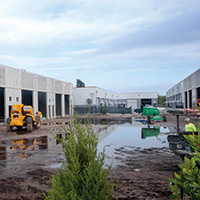 Going fast: Final phase of $25M luxury garage project is half sold
Going fast: Final phase of $25M luxury garage project is half sold
STORY BY STEVEN M. THOMAS (Week of January 18, 2024)
A half dozen Ferraris, a $2 million Provost motorhome, luxury boats, and collections of historic maps, books and military figurines: All will soon have a new home, safe from the fiercest Florida storms, in phase 2 of Motorhaus 2.0.
A year and a half after breaking ground on the 100,000-square-foot, $25 million luxury garage project, builder Vic Lombardi says “the market reception has been incredible.”
“We will be finished in late March or early April, and I expect to be sold out by then,” says his partner Joe Schulke, an engineer with Schulke, Bittle & Stoddard, one of the county’s top civil and structural engineering firms.
The partners completed the project’s 7-building, 67-unit first phase last summer, a year after breaking ground, selling units for an average of about $300,000.
Buyers came from as far away as Melbourne Beach, but 90 percent of the units were purchased by 32963 island residents, according to Schulke.
The developers broke ground on the 3-building, 25-unit second phase in October. Three months later, all the tilt-wall, concrete-and-steel buildings are up, and half the units sold.
“The second phase has gone even smoother and faster than the first phase because all of the infrastructure was already in,” said Lombardi. “We are getting the process down to a science at this point. We have great subcontractors. Most of them worked on the first phase of Motorhaus 2.0 and on our earlier storage projects and they really know what they are doing.”
“The subs all work well together and help each other, and that helps the project a lot,” said construction superintendent John Zuefle.
Schulke said most of the units at Motorhaus 2.0 have been snapped up by “car guys” looking for secure, convenient storage for vintage high-performance and luxury cars.
“We have one buyer who has 36 Ferraris,” Schulke told Vero Beach 32963 last week. “Most of his cars are in Texas, but he has six of them here and needed a place to keep them.”
A “car couple” who race Porches in their spare time bought the biggest garage in the complex to house and work on their cars, paying approximately $700,000 for a 3,000-square-foot double unit in Building C in the project’s second phase.
The couple didn’t want a column in the middle of their space where a wall would normally have been, so Schulke the engineer and Lombardi the builder beefed up the steel I-beam that carries the roof load over the space, creating a clear span 50 feet wide.
“That is the only unit that is drive-thru,” Lombardi said. “You can drive in one side and out the other” through 12-foot-wide by 14-foot-high garage doors big enough for the largest recreational vehicles.
One unit at the project was purchased to keep the buyer’s $2 million Provost motorhome safe, secure and out of the weather.
Buyers have also tapped their bank accounts to purchase Motorhaus 2.0 units to store expensive boats during hurricane season and for a range of other storage purposes.
“There is a fellow who is a collector of historic maps and books, and he bought a unit to store that material in a secure, climate-controlled environment,” Schulke said.
“We had another lady whose husband had a large collection of historic military figurines, which filled a museum in Fort Lauderdale for years. He later built a house in Vero and the collection filled the house for years. When he passed away, his widow moved to Grand Harbor and bought a unit just to put all these figurines in.”
Internet-ready units “come pre-plumbed for bathroom/shower, supplied with 100- or 125-amp electric panel, monitored fire and smoke detectors, automated ventilation, electric powered industrial garage door, and front and rear entry man doors,” according to the project website.
“For someone storing an RV or boat, that is all they need, but there are basically unlimited upgrades available,” Lombardi said. “We sold about $1.5 million in optional upgrades in the first phase, mainly putting in air conditioning, epoxy floors and interior painting. We also make contractor recommendations if buyers want additional upgrades like finished bathrooms, car lifts and mezzanines.”
“Some people have a nice car or two they want to store and work on, but they are basically building man caves, spending $200,000 or more to customize their units,” Schulke said. “Some have teenage kids and are setting the units up partly for the teens to hang out and play air hockey or video games or maybe work on a car.”
Mezzanine structures, which consist of a slip-resistant steel staircase and steel platform bolted in place at the back of a unit, fit easily in the high-ceiling garages and can increase usable floor space by 30 percent, turning a 24-foot by 48-foot 1,150-square-foot unit into a 1,500-square-foot unit for about $40,000.
“We are up to about a dozen of those mezzanine structures,” said Zuefle. “The contractor buys several at a time to save on shipping costs. They are bolted together onsite.”
The steel decks of the mezzanines have a plywood overlay and can be fitted with hardwood or carpet for a more luxurious finish.
Schulke and Lombardi attribute part of the project’s success to its location on 41st street, a block west of U.S. 1, which is only a 10-minute drive from island bridges.
“It is located back out of the hurricane wind zone and up on the Atlantic coastal sand ridge, so it is not in any kind of flood zone,” Schulke said. “We are building at the highest point between the Indian River and I-95, in a spot that is close and convenient for island residents.”
The buildings’ sleek Bauhaus-influenced design is another draw.
“It is crisp, clean construction,” Lombardi said. “The buildings look like there should be a Ferrari sitting in front. People are proud to bring their friends over here and show them their cars.”
Besides protecting valuable property and serving as hang-out spots to watch football or work on cars, the luxury garages are also handy hurricane shelters where island owners can safely ride out big storms inside thick, steel-reinforced concrete walls, tapping into onsite generators if the power goes out.
Motorhaus 2.0 is fenced and gated with private individual security codes and a phalanx of security cameras. There are men’s and women’s restrooms and a vehicle wash area. The isles between the buildings are 50 feet to 70 feet wide, making it easy to maneuver big RVs and boat trailers. The dozen remaining units range from 920 square feet to 1,500 square feet and are priced from $230,000 to $355,000.
Schulke and Lombardi’s first luxury garage project was Autohaus, a 37-unit development on 12th St. near the 17th St. bridge, which they built with several other partners and completed in 2019. Next came Motorhaus, a 17-unit project located between the railroad tracks and U.S. 1, a block north of 41st street, which was finished in 2021.
Sales of boats, RVs and other “big boy toys” went wild during the pandemic, driving demand for large luxury storage units, and Schulke and Lombardi are actively looking for a location to build a fourth high-end garage project.
“You have to locate the right piece of land at the right price with the right zoning for it to make sense,” Schulke said. “That’s not easy to find.”



